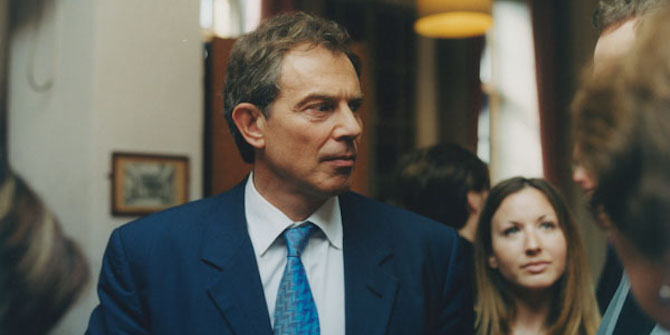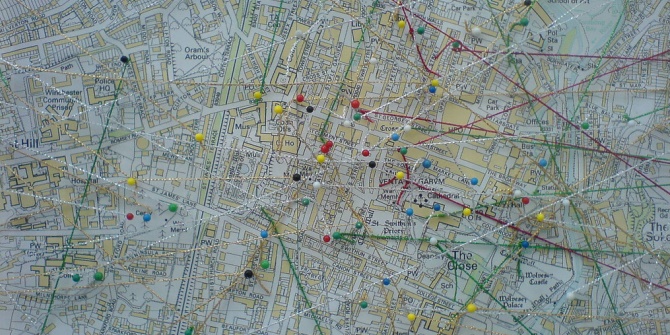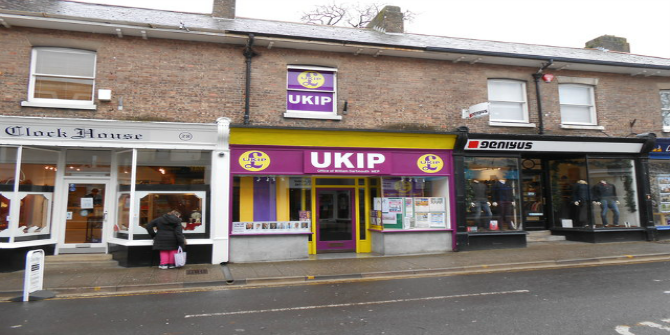 Campaigners should not overestimate the influence of traditional newspapers, says Charlie Beckett: their sales are in decline and they face competition from more politically neutral and humorous news sites like Buzzfeed and Vice. In any case, it is patronising to assume that a sheep-like public follow the diktats of the media they read. He identifies the outlets which will help swing voters make up their minds: TV, Facebook and other social media.
Campaigners should not overestimate the influence of traditional newspapers, says Charlie Beckett: their sales are in decline and they face competition from more politically neutral and humorous news sites like Buzzfeed and Vice. In any case, it is patronising to assume that a sheep-like public follow the diktats of the media they read. He identifies the outlets which will help swing voters make up their minds: TV, Facebook and other social media.
For those campaigning to keep Britain in the EU, what they call ‘the media’ are seen as one of their biggest problems. Europhiles complain that over-mighty British newspapers are brainwashing readers into voting to leave at the behest of their Eurosceptic proprietors. Broadcasters, they say, are placidly going along with this agenda instead of setting out the evidence-base and the rational arguments. Most important politically, this view is tactically counter-productive. It also misunderstands the power logics of contemporary UK news media and it might even miss an opportunity to strengthen the ‘stay’ strategy.
I am certainly not going to argue that the UK news media is predominantly pro-European. Nor am I going to suggest that the quality of the coverage is particularly impressive. It is certainly not impartial. Even organisations such as the BBC that strive for balance face a particular challenge with a referendum like this, compared to – say – a national election. However, it is important to distinguish between the complications and contradictions of the politics itself and the media coverage that will reflect the often irrational, unstable and complex nature of the debate.
Newspapers – even online – are in decline
UK newspapers are not as powerful as the conspiracy theorists suggest or as they themselves would love you to think. Their sales are declining year on year. Their online reach is impressive but the broadcasters are punching their weight too. Even a relatively small TV newsroom such as ITN’s Channel 4 News is having a significant impact on the fast-growing marketplace for video accessed through social media. Other ‘digital native’ online news sites such as Buzzfeed and Vice produce serious analysis as well as more traffic-catching humorous takes on Europe. They tend to be either relatively ‘neutral’ or liberal, pro-European leaning to reflect the attitudes of their younger target audiences.
Understanding how media shapes public attitudes is a notoriously difficult area for empirical research. However, the public say that it is broadcast news and programmes such as BBC Question Time that give them the best information to make up their mind. Newspapers do not determine the broadcasters’ editorial agenda to anything like the degree that their proprietors might hope. Longer term it is arguable that the decades-long diet cooked up by most of the UK newspapers of anti-Brussels stories has helped foster a more Eurosceptical public atmosphere. But this would only have worked if the readers themselves were persuadable. Blaming newspapers for telling voters want to think is deeply insulting to the citizen.
Where newspapers and influential publications such as The Spectator might have more of an impact is on the Leave campaign groups and Conservative politicians and activists. This will be especially true when we get to the crunch on Cameron’s new deal with the rest of Europe and subsidiary issues such as the possible second vote scenario. At that point the echo chamber of the various sceptic factions will resonate more loudly with what the right-wing press is saying.
Referenda pose special challenges
The Scottish referendum was an interesting foretaste of the kind of editorial problems that the BBC faces. It always gets accused of bias during a national election campaign but a referendum presents different challenges. Referenda offer a stark binary choice, unlike elections, where there are a range of positions. They are also one-offs, supposedly ‘do or die’ polls where your campaign doesn’t get a second chance. Voters are not being asked to trust a party or their range of policies: they are being asked to answer a single specific and quite technical question. This means that the campaigners will inevitably see everything in the media that does not support their view as an opposing, not just different view.
So any broadcasters trying to show all the nuances and the range of opinions or facts is inevitably in for a much harder kicking from those fighting for victory at all costs. The challenge for the BBC – and the other regulated broadcasters – will be to do more than just provide ‘seesaw’ balanced coverage that puts the two Punch and Judy points of view. It must also dig deeper into the facts and present the real complexities of what is at stake. The BBC is very conscious of this, and if it gets anywhere near to it then it will offer a healthy alternative to what is likely to become much more narrow and partisan reporting from the press as the voting day draws nearer.
As already mentioned, social media is an increasingly important field for public discourse. News organisations now fill the platforms with their material and their journalists often seem to be more obsessed by them than the public. It is easy to deride the often harsh and simplistic tone of online debate. It is also easy to show that Twitter or Facebook don’t ‘win’ elections anymore than The Sun does. Jeremy Corbyn was optimistic to think that somehow it will allow his supporters to bypass mainstream media. But campaigners would do well to be on it. It is increasingly the primary or supplementary source for news and views both for younger people and those more interested in politics. And not just Twitter. As the Conservatives found out as the last election, it is Facebook that reaches the swing voters and allows your message the engagement that will potentially reinforce or condition voters’ views. It is social media – especially Facebook – that will give the data that allows campaigners to target their other persuasive tools such as email and phone calls.
The risky ‘false consciousness’ strategy
So with this range of media the role of newspapers looks increasingly partial and probably minor. The danger for the Europhiles is of assuming that their position is the only rational one and that voters will be duped by tabloid headlines. The false consciousness theory will make them and the EU look even more elitist and out of touch then it is already. Happily for the Stay lobby, there may even be a case that the shrill Eurosceptic press might put off voters. Analysis suggests that there are two substantial blocks of voters with pretty settled views. But of the undecided voters what concerns them most is the risk of leaving. They are not attracted by more extreme statements. Quoting the hysterical misrepresentations of the facts in a paper like the Express may not be the best persuasive technique for these people. In the face of a frantic press onslaught, it is possible that they are more likely to stick with the status quo.
We in the UK have a lopsided but rich news media – especially now so much public debate flows through digital spaces where citizens can critique each other, journalists and politicians directly. Yes, newspapers are predominantly right-wing but even Lord Leveson recognised that British political journalism is relatively diverse, robust and independent. There is a significant left/liberal press for people to turn to alongside one of the most impressive public service broadcasting sectors in the world. The real danger, I suspect, is not that the public will be told what to think by Rupert Murdoch, but that they will find the whole exercise too boring.
___
Please note: this article originally appeared on LSE BrexitVote.
 Professor Charlie Beckett is Director of Polis, the LSE’s journalism think-tank, and a former journalist with the BBC and ITN.
Professor Charlie Beckett is Director of Polis, the LSE’s journalism think-tank, and a former journalist with the BBC and ITN.









“”Blaming newspapers for telling voters want to think is deeply insulting to the citizen.””
Is it then deeply insulting to the citizen to suggest that advertising works? After all, there is a sizeable literature suggesting that it does. There’s even a pretty solid literature about where low-information voters go for information. And many of those places, including Facebook, are deeply influenced by outlets like the Daily Mail.
Mass media will indeed decide the EU referendum, of which newspapers are but a segment. Who, then, constitutes mass media? A mere six billionaires: Murdoch, Rockefeller, Bronfman, Newhouse, Redstone, and Rothschild. Their mass media is a powerful ‘Matrix” spinning a false consciousness that most perceive as reality.
This is diabolical hogwash. The media not only influence events like elections they are continuously manipulating the “Concencus Reality” for The Corporations to keep the population in the dark about;
The ISIS dialogue: Disinformation & lies.
The Real Economy & the government’s refusal to help the population.
The Western Media fabrications & diversions.
The Global Economy
The Global Government
The Corporate Tax Criminals.
The destruction of Justice, financial integrity & Democracy
The introduction of a Global Corporate Legal System run by Corporate Criminals.
The use of covert mercenaries & the Main Stream Media to manipulate public opinion for war & corporate profit.
Refugees in Europe & the mass rape of women.
The planned destruction of Europe & the Middle East.
The wars in Syria & the Middle East.
How Climate Change is confused by lies.
Corporate fraud & pollution unchecked & unpunished.
The covert introduction of Martial Law
Psychopath bankers running a global Government.
The government’s failure to protect the UK population in any way.
The failure of Law & Order in the Corporate Economy.
The introduction of new trade agreements in secret to destroy the UK populations freedoms & protection from fraud.
The failure of the USA/UK/EU to negotiate an agreement with other countries for the future of the world economy.
The destruction of the world economy by banker fraud & corporate fraud.
The planned destruction of Sovereign Nations
The failure to engage the public in the Global/National government debate.
The United Nations Global Police Force.
50 years of CIA Weaponised Weather
Is the USA in a covert war with Europe?
Which western governments wage war on their own people?
Psychologists say that people will only accept ideas that don’t threaten their own security.
Well said Vernon! http://www.poclad.org